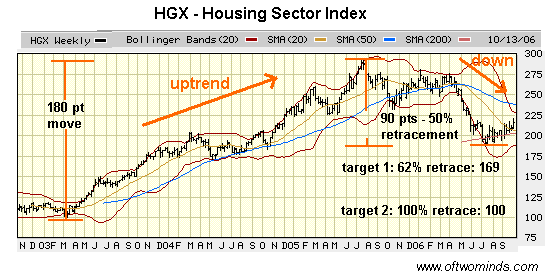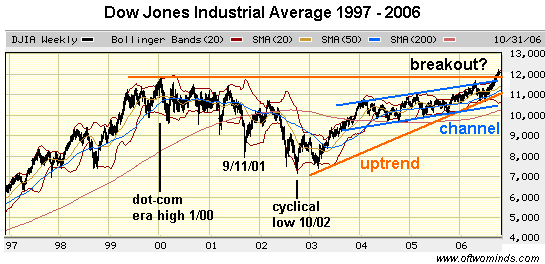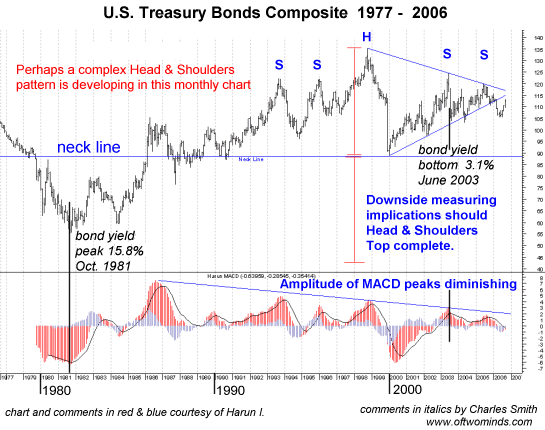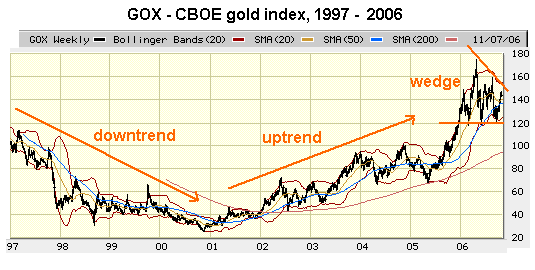

|
| weblog/wEssays archives | home | |
|
Financial Survival (November 9, 2006) Now that the political circus has ended, let's return to what is beyond the control of the Federal government in whatever political configuration you assemble: the global economy and its impact on our individual financial future. Reader D. Tofel asks the question we all face very succinctly: Many, many thanks for your insightful articles. I have found myself making the same observations and wondering why I was the only one seeing the insanity in the real estate market and elsewhere. I have also been following the peak oil issue very closely.This gets right to the core issue: financial survival. Let's start with what we know: 1. No one can predict the future. If this were easy, we'd all be millionaires. 2. "The trend is your friend." Markets have a way of rising and falling in long-term trends which often make no sense in terms of fundamentals like value and earnings. But betting against the trend is a good way to lose your shirt--no matter how right you may be about its unsustainability. The housing bubble is a good example. I wrote an article for the San Francisco Chronicle back in 2004 calling for a top in housing. The bubble promptly expanded for another year and a half. My point: the trend runs until it stops and then reverses. Trying to call the top before it is visible is a fool's errand. (As I so ably proved.) 3. No one can predict the ultimate top or bottom in any market. No one predicted in 1995 when the Nasdaq topped 1,000 for the first time that it would run to 5,000 in a mere five years, just as no one in 1996 predicted house prices would triple in California. And of course no one in 2000 predicted Nasdaq would fall to 1,100 within 2.5 years. 4. Those who make money buy when no one else is buying. Those who lose money buy when everyone else has already bought. For instance: housing sales were slow in 1996; no one was buying 3 or 4 houses to speculate on rising prices. Gold and oil stocks were at multi-year lows in 2000, as the feverish buying was concentrated in technology stocks. Those few souls who bought gold and oil stocks instead of technology stocks are now wealthy, while everyone who bought tech stocks (and didn't get out in March 2000) lost their capital. 5. Understanding the reasons behind the trend is less important than getting the trend right. The whys and the wherefores of the oil and gold markets in 1999 - 2001 were debatable, but the beginning of a new uptrend was not. 6. The real financial harm comes not from missing the latest "get rich quick" idea but from the destruction of capital in a losing bet. The person who sat out the housing bubble did not rake in $100,000 from flipping a few homes in the last manic rise of 2004-2005, but then on the other hand, they are also not facing foreclosure and bankrupcty on the 4 homes they bought in 2005 (to flip for vast profits, of course) in 2006. Investors like Warren Buffett who sat out the dot-com bubble looked like idiots in 1999 and geniuses by 2002. Yes, Buffett passed up massive profits, but he also preserved his investors' capital while others lost trillions. So what trends are visible? Let's look at some charts. 
Here we see a proxy for the housing market, the homebuilders' index. The uptrend has reversed and a downtrend is in place. Since no one can predict the bottom, prudence suggests avoiding the housing and real estate markets until the downtrend ends. That will only be apparent after a new uptrend has become visible. 
Even if you are convinced that the U.S. economy is about to implode (as I am), the trend in the Dow Jones Industrials is solidly up. How long the uptrend will last, or when it will reverse, is unknown. In general, such a breakout is bullish. 
The bond market has formed a wedge. It could break up or down. Prudence suggests awaiting for the break to occur, i.e. waiting for a trend up or down to become visible. In the meantime, bond investors won't lose their capital owning short-term (90-day or 6-month) Treasury bonds. 
Here is a 10-year chart of the CBOE gold index. Note the downtrend, the uptrend, and the current wedge. Again, prudence suggests waiting for the wedge to break up or down rather than deciding ahead of time which way it "should" go. The current uptrend suggests the wedge will break to the upside, but again, the future is unknown. The presence of wedge formations in both bonds and gold suggest that the level of uncertainty about the future is high. Markets dislike uncertainty, so it's prudent to wait for the trend to become visible. Regarding yesterday's post on derivatives, frequent contributor Harun I. had this recommendation for further reading on the subject: You post today was great. I would strongly recommend to every one of your readers to read copy of When Genius Failed: The Rise and Fall of Long-Term Capital ManagementThank you, Harun, for the insightful comment and recommendation. To sum up one possible answer to D. Tofel's excellent question: What can I as an individual do to survive? Avoid risky markets, be prudent in preserving your capital, and don't bet against the trend. For more on this subject and a wide array of other topics, please visit my weblog. copyright © 2006 Charles Hugh Smith. All rights reserved in all media. I would be honored if you linked this wEssay to your site, or printed a copy for your own use. |
||
| weblog/wEssays | home |